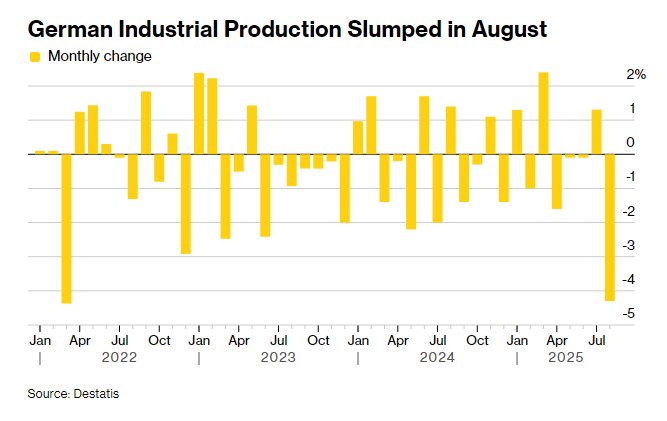
German industrial production fell the most since early 2022, with output decreasing 4.3% in August from the previous month, Bloomberg reports.
German industrial production fell the most since early 2022, evidence of the struggle by Europe’s biggest economy to shake off a multi-year slump.
Output decreased 4.3% in August from the previous month, driven by an 18.5% drop in auto manufacturing, Destatis said Wednesday. That’s far worse than any forecast in a Bloomberg survey of 22 economists.
“The marked decrease may be explained, at least in part, by the combination of annual plant closures for holidays and production changeovers” in the car industry, the statistics office said in a statement.
The report, together with data earlier in the week showing that factory orders unexpectedly fell for a fourth month, highlight the persisting weakness afflicting Germany as it reels from the cumulative impact of tariffs, the energy shock and Chinese competition.
This week, BMW AG lowered its financial guidance for the year on persistently weak sales in China and tariff-related costs, underscoring the difficulties Germany’s export-reliant auto industry is facing. That comes after Robert Bosch GmbH said in late September that it will cut about 13,000 additional jobs at its auto-parts business.
Economists diverged in their initial reaction to the news, with Martin Ademmer of Bloomberg Economics saying that the numbers “indicate the sector is unlikely to contribute meaningfully to growth in the second half of 2025.”
Meanwhile Carsten Brzeski, ING’s global head of macro, was even more downbeat.
“This remains the clearest illustration of the structural challenges facing German industry,” he said in a report. “Available monthly data so far suggests that the risk of yet another quarter of contraction and thus an outright technical recession is very real.”
“Current indicators suggest a mixed picture for the rest of the year, reflecting the continuing high level of geopolitical and trade policy uncertainty,” the Economy Ministry said in a statement. “The leading indicators currently point to continued weak economic development in the third quarter of 2025.”
read more in our Telegram-channel https://t.me/The_International_Affairs

 10:38 11.10.2025 •
10:38 11.10.2025 •






















